Oncology Unit Practicum: Reflective Journal on Patient Care
VerifiedAdded on 2023/06/13
|10
|3444
|205
AI Summary
This reflective account explores a student's experiences during an oncology practicum, focusing on patient care within an oncology unit. The reflection covers trigger events, appraisal of patient conditions, and integration of knowledge gained. Key areas discussed include the emotional impact of cancer diagnosis, effective communication strategies for building trust with patients, and understanding various diagnostic tools and treatment options like chemotherapy and palliative care. Ethical considerations, such as patient autonomy in treatment choices, are also addressed. The practicum provided insights into managing patient pain, providing supportive care, and the challenges of dealing with advanced-stage cancers, emphasizing the importance of a holistic approach to oncology care.
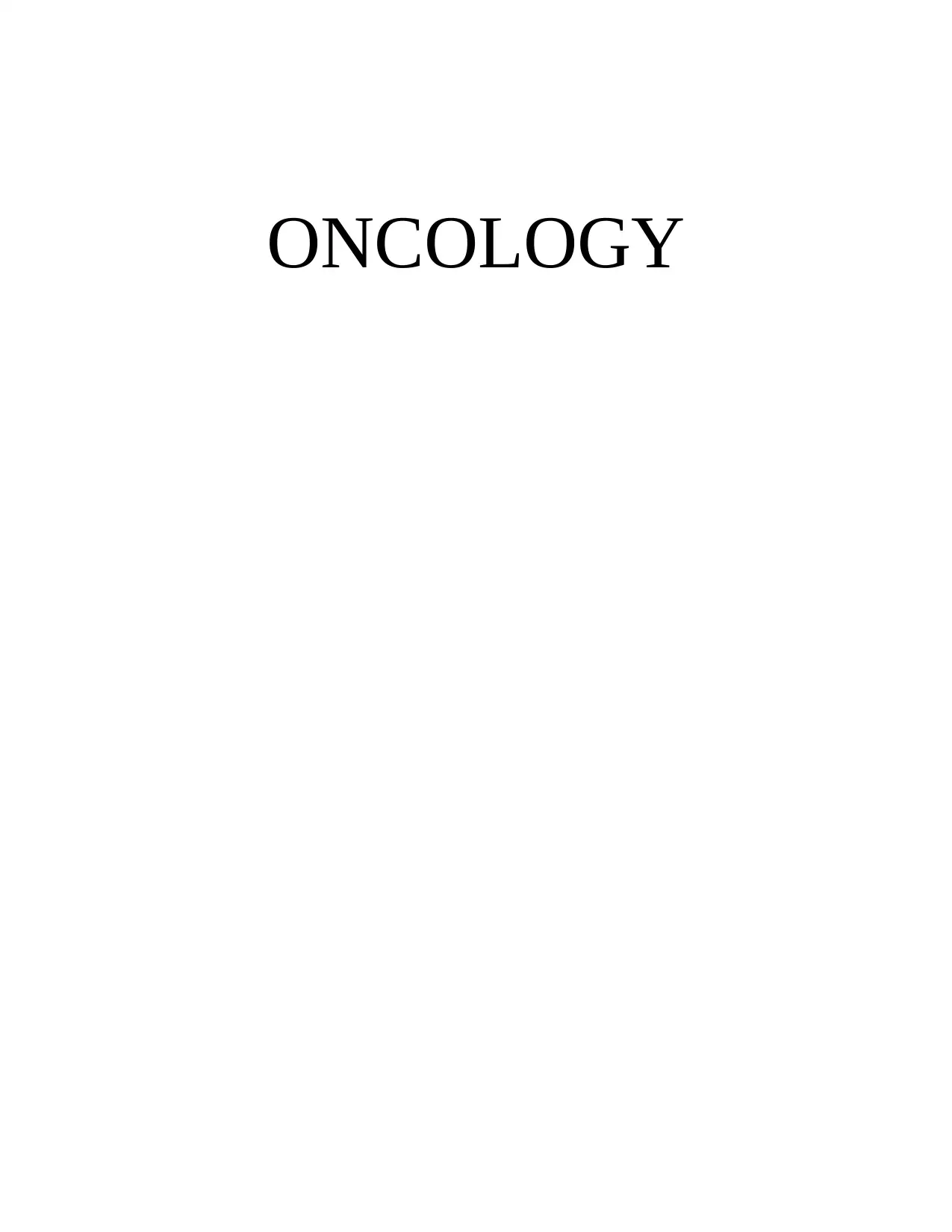
ONCOLOGY
Paraphrase This Document
Need a fresh take? Get an instant paraphrase of this document with our AI Paraphraser
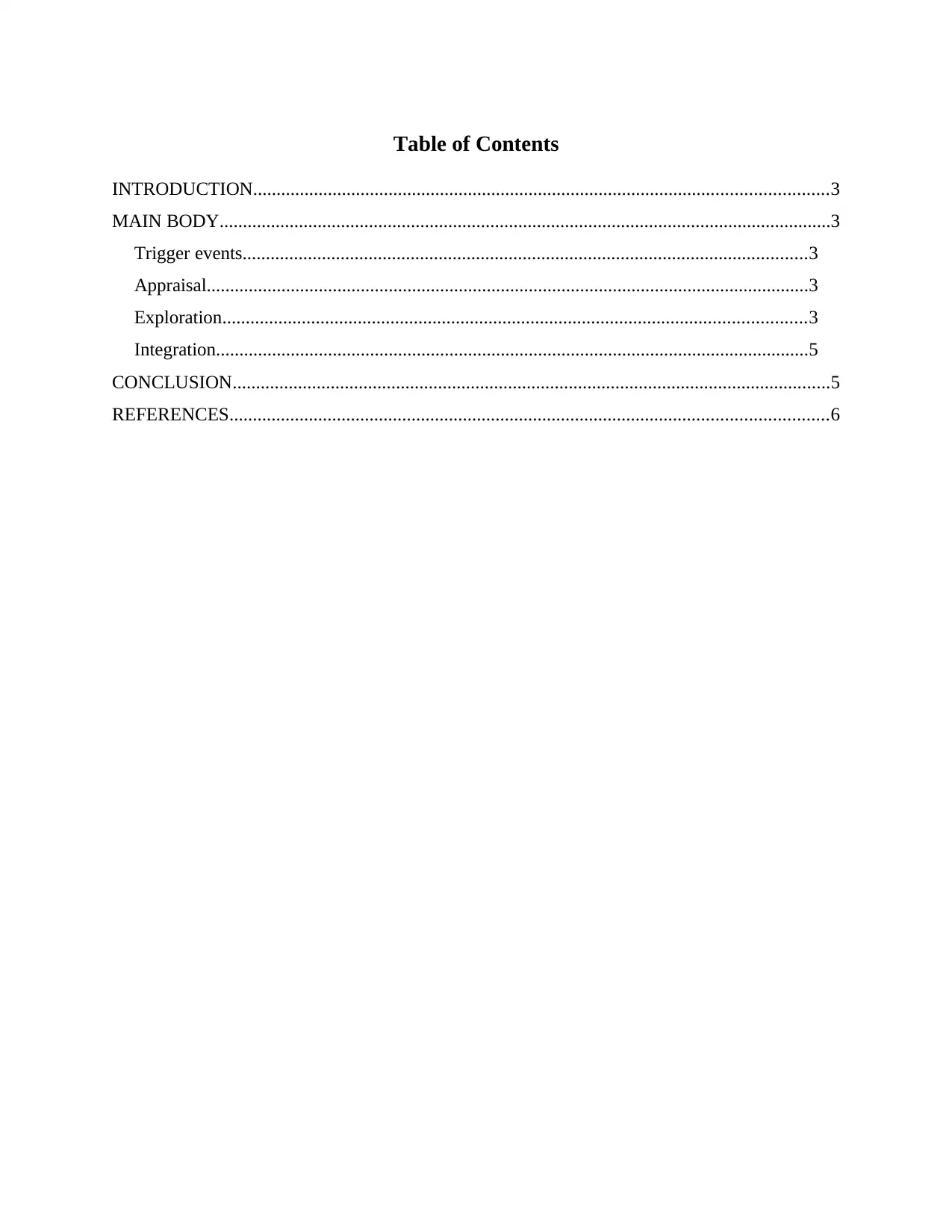
Table of Contents
INTRODUCTION...........................................................................................................................3
MAIN BODY...................................................................................................................................3
Trigger events.........................................................................................................................3
Appraisal.................................................................................................................................3
Exploration.............................................................................................................................3
Integration...............................................................................................................................5
CONCLUSION................................................................................................................................5
REFERENCES................................................................................................................................6
INTRODUCTION...........................................................................................................................3
MAIN BODY...................................................................................................................................3
Trigger events.........................................................................................................................3
Appraisal.................................................................................................................................3
Exploration.............................................................................................................................3
Integration...............................................................................................................................5
CONCLUSION................................................................................................................................5
REFERENCES................................................................................................................................6
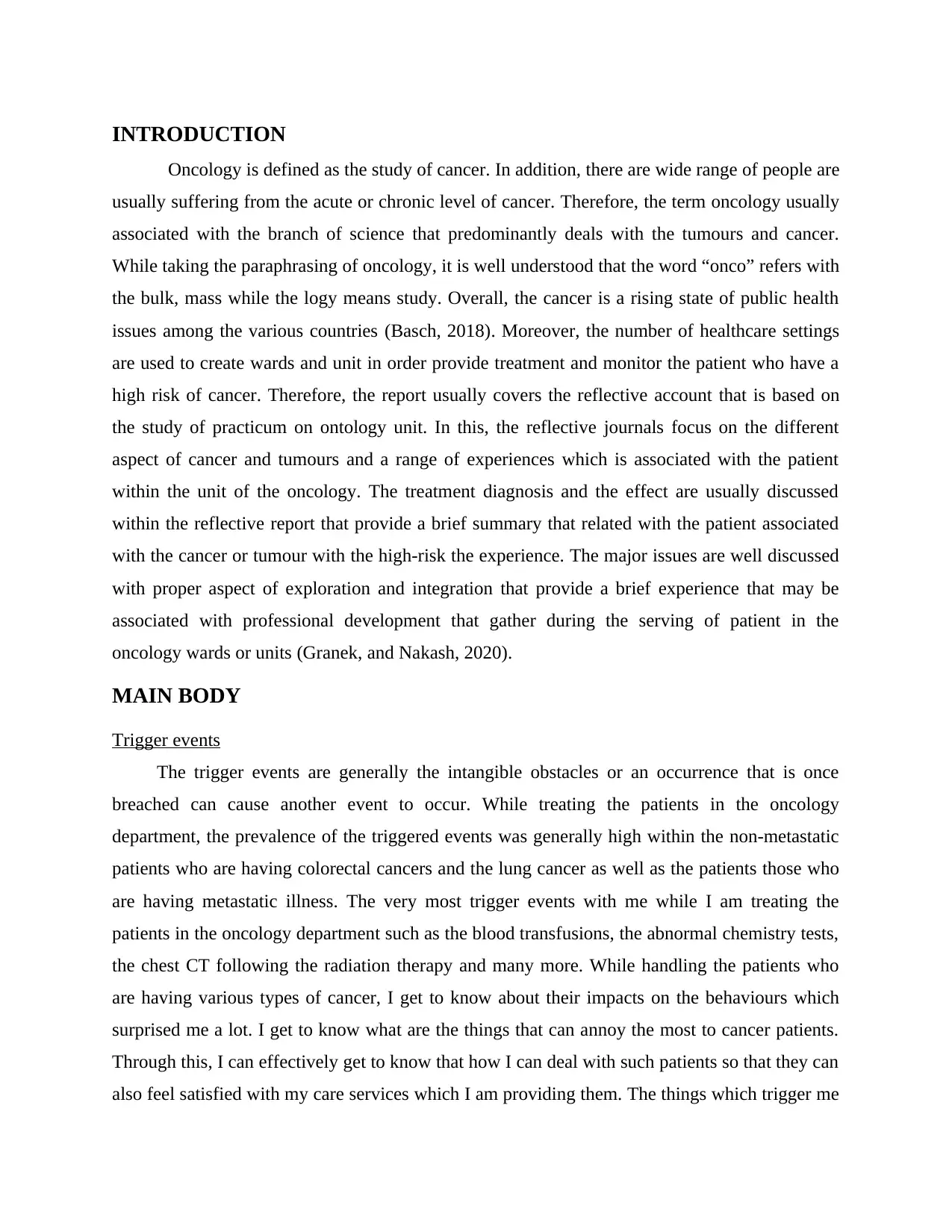
INTRODUCTION
Oncology is defined as the study of cancer. In addition, there are wide range of people are
usually suffering from the acute or chronic level of cancer. Therefore, the term oncology usually
associated with the branch of science that predominantly deals with the tumours and cancer.
While taking the paraphrasing of oncology, it is well understood that the word “onco” refers with
the bulk, mass while the logy means study. Overall, the cancer is a rising state of public health
issues among the various countries (Basch, 2018). Moreover, the number of healthcare settings
are used to create wards and unit in order provide treatment and monitor the patient who have a
high risk of cancer. Therefore, the report usually covers the reflective account that is based on
the study of practicum on ontology unit. In this, the reflective journals focus on the different
aspect of cancer and tumours and a range of experiences which is associated with the patient
within the unit of the oncology. The treatment diagnosis and the effect are usually discussed
within the reflective report that provide a brief summary that related with the patient associated
with the cancer or tumour with the high-risk the experience. The major issues are well discussed
with proper aspect of exploration and integration that provide a brief experience that may be
associated with professional development that gather during the serving of patient in the
oncology wards or units (Granek, and Nakash, 2020).
MAIN BODY
Trigger events
The trigger events are generally the intangible obstacles or an occurrence that is once
breached can cause another event to occur. While treating the patients in the oncology
department, the prevalence of the triggered events was generally high within the non-metastatic
patients who are having colorectal cancers and the lung cancer as well as the patients those who
are having metastatic illness. The very most trigger events with me while I am treating the
patients in the oncology department such as the blood transfusions, the abnormal chemistry tests,
the chest CT following the radiation therapy and many more. While handling the patients who
are having various types of cancer, I get to know about their impacts on the behaviours which
surprised me a lot. I get to know what are the things that can annoy the most to cancer patients.
Through this, I can effectively get to know that how I can deal with such patients so that they can
also feel satisfied with my care services which I am providing them. The things which trigger me
Oncology is defined as the study of cancer. In addition, there are wide range of people are
usually suffering from the acute or chronic level of cancer. Therefore, the term oncology usually
associated with the branch of science that predominantly deals with the tumours and cancer.
While taking the paraphrasing of oncology, it is well understood that the word “onco” refers with
the bulk, mass while the logy means study. Overall, the cancer is a rising state of public health
issues among the various countries (Basch, 2018). Moreover, the number of healthcare settings
are used to create wards and unit in order provide treatment and monitor the patient who have a
high risk of cancer. Therefore, the report usually covers the reflective account that is based on
the study of practicum on ontology unit. In this, the reflective journals focus on the different
aspect of cancer and tumours and a range of experiences which is associated with the patient
within the unit of the oncology. The treatment diagnosis and the effect are usually discussed
within the reflective report that provide a brief summary that related with the patient associated
with the cancer or tumour with the high-risk the experience. The major issues are well discussed
with proper aspect of exploration and integration that provide a brief experience that may be
associated with professional development that gather during the serving of patient in the
oncology wards or units (Granek, and Nakash, 2020).
MAIN BODY
Trigger events
The trigger events are generally the intangible obstacles or an occurrence that is once
breached can cause another event to occur. While treating the patients in the oncology
department, the prevalence of the triggered events was generally high within the non-metastatic
patients who are having colorectal cancers and the lung cancer as well as the patients those who
are having metastatic illness. The very most trigger events with me while I am treating the
patients in the oncology department such as the blood transfusions, the abnormal chemistry tests,
the chest CT following the radiation therapy and many more. While handling the patients who
are having various types of cancer, I get to know about their impacts on the behaviours which
surprised me a lot. I get to know what are the things that can annoy the most to cancer patients.
Through this, I can effectively get to know that how I can deal with such patients so that they can
also feel satisfied with my care services which I am providing them. The things which trigger me
⊘ This is a preview!⊘
Do you want full access?
Subscribe today to unlock all pages.

Trusted by 1+ million students worldwide
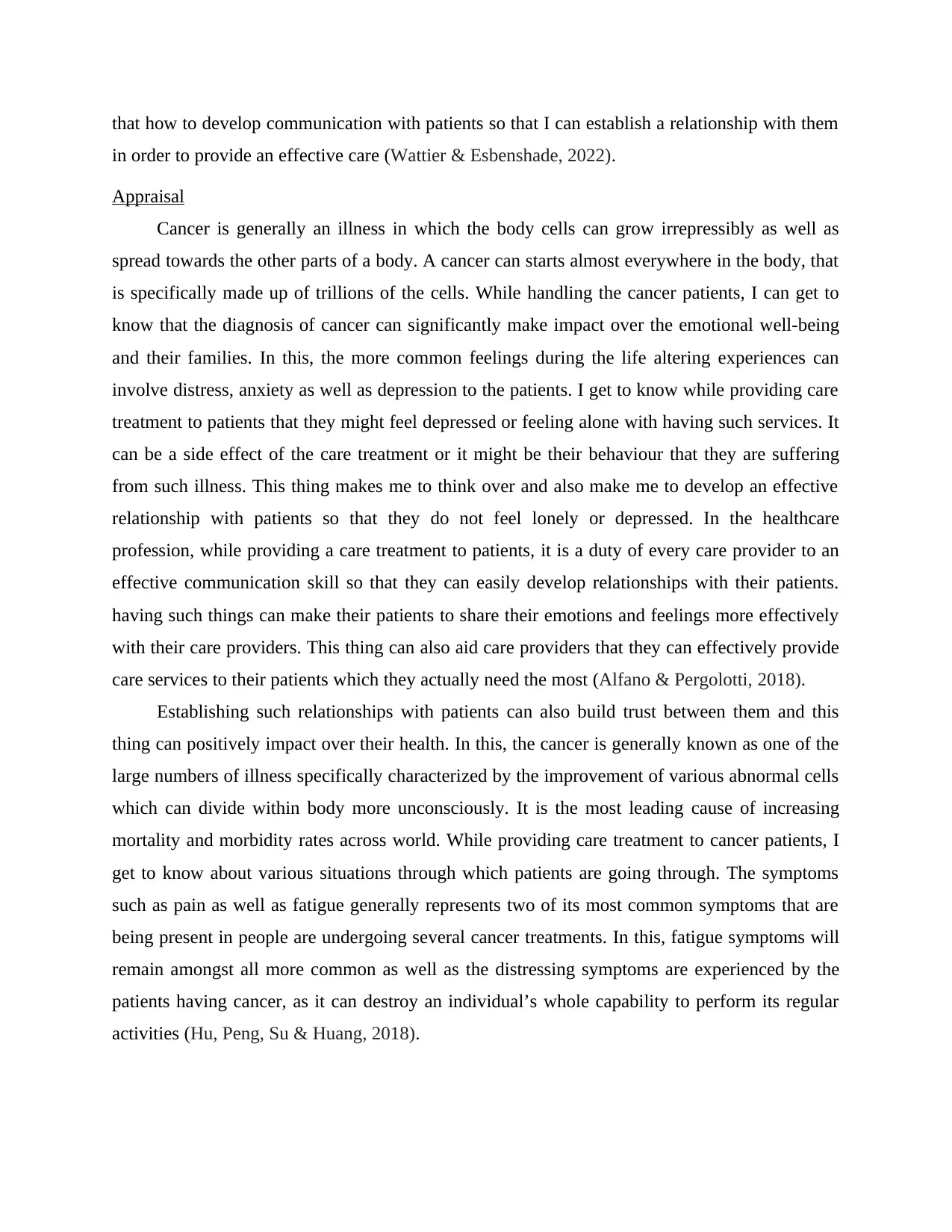
that how to develop communication with patients so that I can establish a relationship with them
in order to provide an effective care (Wattier & Esbenshade, 2022).
Appraisal
Cancer is generally an illness in which the body cells can grow irrepressibly as well as
spread towards the other parts of a body. A cancer can starts almost everywhere in the body, that
is specifically made up of trillions of the cells. While handling the cancer patients, I can get to
know that the diagnosis of cancer can significantly make impact over the emotional well-being
and their families. In this, the more common feelings during the life altering experiences can
involve distress, anxiety as well as depression to the patients. I get to know while providing care
treatment to patients that they might feel depressed or feeling alone with having such services. It
can be a side effect of the care treatment or it might be their behaviour that they are suffering
from such illness. This thing makes me to think over and also make me to develop an effective
relationship with patients so that they do not feel lonely or depressed. In the healthcare
profession, while providing a care treatment to patients, it is a duty of every care provider to an
effective communication skill so that they can easily develop relationships with their patients.
having such things can make their patients to share their emotions and feelings more effectively
with their care providers. This thing can also aid care providers that they can effectively provide
care services to their patients which they actually need the most (Alfano & Pergolotti, 2018).
Establishing such relationships with patients can also build trust between them and this
thing can positively impact over their health. In this, the cancer is generally known as one of the
large numbers of illness specifically characterized by the improvement of various abnormal cells
which can divide within body more unconsciously. It is the most leading cause of increasing
mortality and morbidity rates across world. While providing care treatment to cancer patients, I
get to know about various situations through which patients are going through. The symptoms
such as pain as well as fatigue generally represents two of its most common symptoms that are
being present in people are undergoing several cancer treatments. In this, fatigue symptoms will
remain amongst all more common as well as the distressing symptoms are experienced by the
patients having cancer, as it can destroy an individual’s whole capability to perform its regular
activities (Hu, Peng, Su & Huang, 2018).
in order to provide an effective care (Wattier & Esbenshade, 2022).
Appraisal
Cancer is generally an illness in which the body cells can grow irrepressibly as well as
spread towards the other parts of a body. A cancer can starts almost everywhere in the body, that
is specifically made up of trillions of the cells. While handling the cancer patients, I can get to
know that the diagnosis of cancer can significantly make impact over the emotional well-being
and their families. In this, the more common feelings during the life altering experiences can
involve distress, anxiety as well as depression to the patients. I get to know while providing care
treatment to patients that they might feel depressed or feeling alone with having such services. It
can be a side effect of the care treatment or it might be their behaviour that they are suffering
from such illness. This thing makes me to think over and also make me to develop an effective
relationship with patients so that they do not feel lonely or depressed. In the healthcare
profession, while providing a care treatment to patients, it is a duty of every care provider to an
effective communication skill so that they can easily develop relationships with their patients.
having such things can make their patients to share their emotions and feelings more effectively
with their care providers. This thing can also aid care providers that they can effectively provide
care services to their patients which they actually need the most (Alfano & Pergolotti, 2018).
Establishing such relationships with patients can also build trust between them and this
thing can positively impact over their health. In this, the cancer is generally known as one of the
large numbers of illness specifically characterized by the improvement of various abnormal cells
which can divide within body more unconsciously. It is the most leading cause of increasing
mortality and morbidity rates across world. While providing care treatment to cancer patients, I
get to know about various situations through which patients are going through. The symptoms
such as pain as well as fatigue generally represents two of its most common symptoms that are
being present in people are undergoing several cancer treatments. In this, fatigue symptoms will
remain amongst all more common as well as the distressing symptoms are experienced by the
patients having cancer, as it can destroy an individual’s whole capability to perform its regular
activities (Hu, Peng, Su & Huang, 2018).
Paraphrase This Document
Need a fresh take? Get an instant paraphrase of this document with our AI Paraphraser
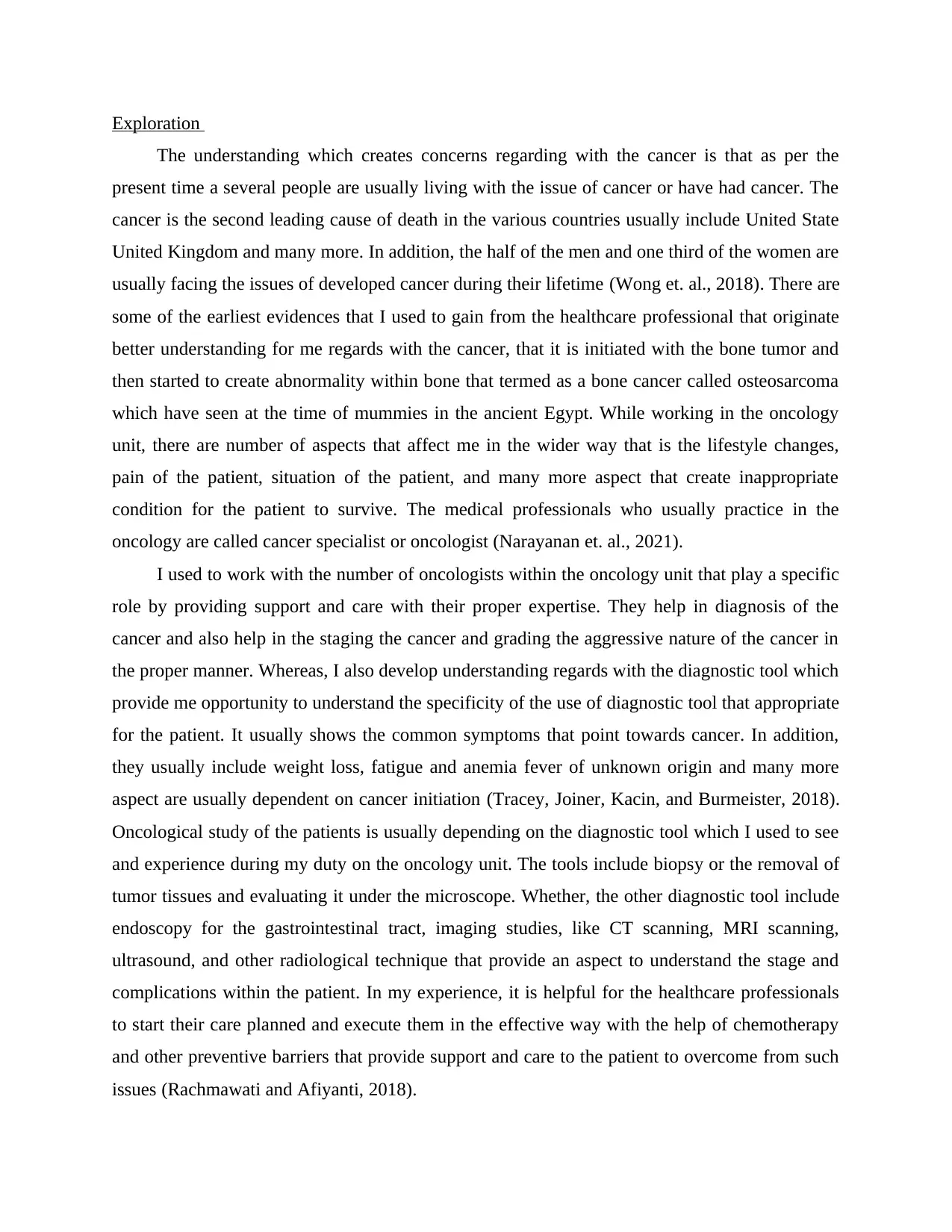
Exploration
The understanding which creates concerns regarding with the cancer is that as per the
present time a several people are usually living with the issue of cancer or have had cancer. The
cancer is the second leading cause of death in the various countries usually include United State
United Kingdom and many more. In addition, the half of the men and one third of the women are
usually facing the issues of developed cancer during their lifetime (Wong et. al., 2018). There are
some of the earliest evidences that I used to gain from the healthcare professional that originate
better understanding for me regards with the cancer, that it is initiated with the bone tumor and
then started to create abnormality within bone that termed as a bone cancer called osteosarcoma
which have seen at the time of mummies in the ancient Egypt. While working in the oncology
unit, there are number of aspects that affect me in the wider way that is the lifestyle changes,
pain of the patient, situation of the patient, and many more aspect that create inappropriate
condition for the patient to survive. The medical professionals who usually practice in the
oncology are called cancer specialist or oncologist (Narayanan et. al., 2021).
I used to work with the number of oncologists within the oncology unit that play a specific
role by providing support and care with their proper expertise. They help in diagnosis of the
cancer and also help in the staging the cancer and grading the aggressive nature of the cancer in
the proper manner. Whereas, I also develop understanding regards with the diagnostic tool which
provide me opportunity to understand the specificity of the use of diagnostic tool that appropriate
for the patient. It usually shows the common symptoms that point towards cancer. In addition,
they usually include weight loss, fatigue and anemia fever of unknown origin and many more
aspect are usually dependent on cancer initiation (Tracey, Joiner, Kacin, and Burmeister, 2018).
Oncological study of the patients is usually depending on the diagnostic tool which I used to see
and experience during my duty on the oncology unit. The tools include biopsy or the removal of
tumor tissues and evaluating it under the microscope. Whether, the other diagnostic tool include
endoscopy for the gastrointestinal tract, imaging studies, like CT scanning, MRI scanning,
ultrasound, and other radiological technique that provide an aspect to understand the stage and
complications within the patient. In my experience, it is helpful for the healthcare professionals
to start their care planned and execute them in the effective way with the help of chemotherapy
and other preventive barriers that provide support and care to the patient to overcome from such
issues (Rachmawati and Afiyanti, 2018).
The understanding which creates concerns regarding with the cancer is that as per the
present time a several people are usually living with the issue of cancer or have had cancer. The
cancer is the second leading cause of death in the various countries usually include United State
United Kingdom and many more. In addition, the half of the men and one third of the women are
usually facing the issues of developed cancer during their lifetime (Wong et. al., 2018). There are
some of the earliest evidences that I used to gain from the healthcare professional that originate
better understanding for me regards with the cancer, that it is initiated with the bone tumor and
then started to create abnormality within bone that termed as a bone cancer called osteosarcoma
which have seen at the time of mummies in the ancient Egypt. While working in the oncology
unit, there are number of aspects that affect me in the wider way that is the lifestyle changes,
pain of the patient, situation of the patient, and many more aspect that create inappropriate
condition for the patient to survive. The medical professionals who usually practice in the
oncology are called cancer specialist or oncologist (Narayanan et. al., 2021).
I used to work with the number of oncologists within the oncology unit that play a specific
role by providing support and care with their proper expertise. They help in diagnosis of the
cancer and also help in the staging the cancer and grading the aggressive nature of the cancer in
the proper manner. Whereas, I also develop understanding regards with the diagnostic tool which
provide me opportunity to understand the specificity of the use of diagnostic tool that appropriate
for the patient. It usually shows the common symptoms that point towards cancer. In addition,
they usually include weight loss, fatigue and anemia fever of unknown origin and many more
aspect are usually dependent on cancer initiation (Tracey, Joiner, Kacin, and Burmeister, 2018).
Oncological study of the patients is usually depending on the diagnostic tool which I used to see
and experience during my duty on the oncology unit. The tools include biopsy or the removal of
tumor tissues and evaluating it under the microscope. Whether, the other diagnostic tool include
endoscopy for the gastrointestinal tract, imaging studies, like CT scanning, MRI scanning,
ultrasound, and other radiological technique that provide an aspect to understand the stage and
complications within the patient. In my experience, it is helpful for the healthcare professionals
to start their care planned and execute them in the effective way with the help of chemotherapy
and other preventive barriers that provide support and care to the patient to overcome from such
issues (Rachmawati and Afiyanti, 2018).
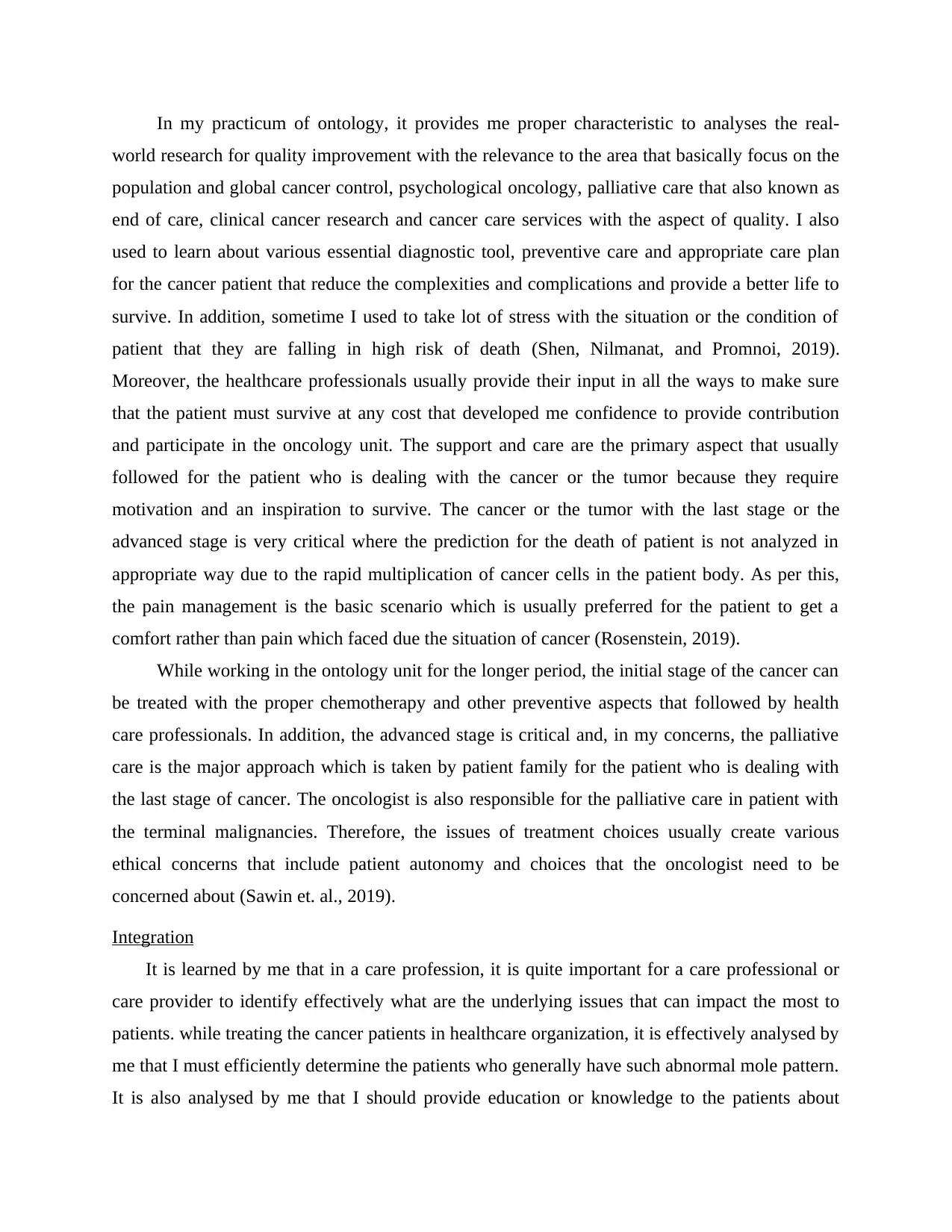
In my practicum of ontology, it provides me proper characteristic to analyses the real-
world research for quality improvement with the relevance to the area that basically focus on the
population and global cancer control, psychological oncology, palliative care that also known as
end of care, clinical cancer research and cancer care services with the aspect of quality. I also
used to learn about various essential diagnostic tool, preventive care and appropriate care plan
for the cancer patient that reduce the complexities and complications and provide a better life to
survive. In addition, sometime I used to take lot of stress with the situation or the condition of
patient that they are falling in high risk of death (Shen, Nilmanat, and Promnoi, 2019).
Moreover, the healthcare professionals usually provide their input in all the ways to make sure
that the patient must survive at any cost that developed me confidence to provide contribution
and participate in the oncology unit. The support and care are the primary aspect that usually
followed for the patient who is dealing with the cancer or the tumor because they require
motivation and an inspiration to survive. The cancer or the tumor with the last stage or the
advanced stage is very critical where the prediction for the death of patient is not analyzed in
appropriate way due to the rapid multiplication of cancer cells in the patient body. As per this,
the pain management is the basic scenario which is usually preferred for the patient to get a
comfort rather than pain which faced due the situation of cancer (Rosenstein, 2019).
While working in the ontology unit for the longer period, the initial stage of the cancer can
be treated with the proper chemotherapy and other preventive aspects that followed by health
care professionals. In addition, the advanced stage is critical and, in my concerns, the palliative
care is the major approach which is taken by patient family for the patient who is dealing with
the last stage of cancer. The oncologist is also responsible for the palliative care in patient with
the terminal malignancies. Therefore, the issues of treatment choices usually create various
ethical concerns that include patient autonomy and choices that the oncologist need to be
concerned about (Sawin et. al., 2019).
Integration
It is learned by me that in a care profession, it is quite important for a care professional or
care provider to identify effectively what are the underlying issues that can impact the most to
patients. while treating the cancer patients in healthcare organization, it is effectively analysed by
me that I must efficiently determine the patients who generally have such abnormal mole pattern.
It is also analysed by me that I should provide education or knowledge to the patients about
world research for quality improvement with the relevance to the area that basically focus on the
population and global cancer control, psychological oncology, palliative care that also known as
end of care, clinical cancer research and cancer care services with the aspect of quality. I also
used to learn about various essential diagnostic tool, preventive care and appropriate care plan
for the cancer patient that reduce the complexities and complications and provide a better life to
survive. In addition, sometime I used to take lot of stress with the situation or the condition of
patient that they are falling in high risk of death (Shen, Nilmanat, and Promnoi, 2019).
Moreover, the healthcare professionals usually provide their input in all the ways to make sure
that the patient must survive at any cost that developed me confidence to provide contribution
and participate in the oncology unit. The support and care are the primary aspect that usually
followed for the patient who is dealing with the cancer or the tumor because they require
motivation and an inspiration to survive. The cancer or the tumor with the last stage or the
advanced stage is very critical where the prediction for the death of patient is not analyzed in
appropriate way due to the rapid multiplication of cancer cells in the patient body. As per this,
the pain management is the basic scenario which is usually preferred for the patient to get a
comfort rather than pain which faced due the situation of cancer (Rosenstein, 2019).
While working in the ontology unit for the longer period, the initial stage of the cancer can
be treated with the proper chemotherapy and other preventive aspects that followed by health
care professionals. In addition, the advanced stage is critical and, in my concerns, the palliative
care is the major approach which is taken by patient family for the patient who is dealing with
the last stage of cancer. The oncologist is also responsible for the palliative care in patient with
the terminal malignancies. Therefore, the issues of treatment choices usually create various
ethical concerns that include patient autonomy and choices that the oncologist need to be
concerned about (Sawin et. al., 2019).
Integration
It is learned by me that in a care profession, it is quite important for a care professional or
care provider to identify effectively what are the underlying issues that can impact the most to
patients. while treating the cancer patients in healthcare organization, it is effectively analysed by
me that I must efficiently determine the patients who generally have such abnormal mole pattern.
It is also analysed by me that I should provide education or knowledge to the patients about
⊘ This is a preview!⊘
Do you want full access?
Subscribe today to unlock all pages.

Trusted by 1+ million students worldwide
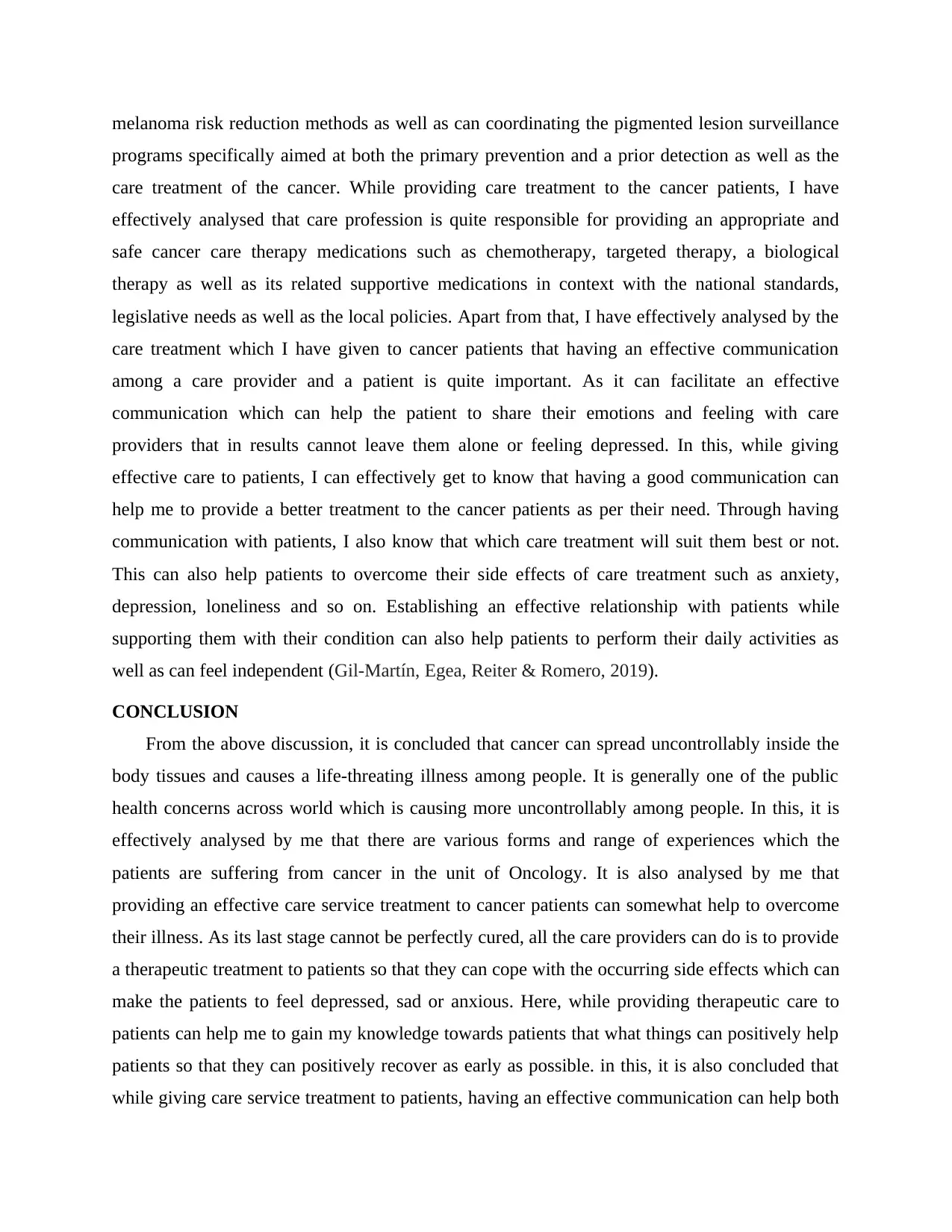
melanoma risk reduction methods as well as can coordinating the pigmented lesion surveillance
programs specifically aimed at both the primary prevention and a prior detection as well as the
care treatment of the cancer. While providing care treatment to the cancer patients, I have
effectively analysed that care profession is quite responsible for providing an appropriate and
safe cancer care therapy medications such as chemotherapy, targeted therapy, a biological
therapy as well as its related supportive medications in context with the national standards,
legislative needs as well as the local policies. Apart from that, I have effectively analysed by the
care treatment which I have given to cancer patients that having an effective communication
among a care provider and a patient is quite important. As it can facilitate an effective
communication which can help the patient to share their emotions and feeling with care
providers that in results cannot leave them alone or feeling depressed. In this, while giving
effective care to patients, I can effectively get to know that having a good communication can
help me to provide a better treatment to the cancer patients as per their need. Through having
communication with patients, I also know that which care treatment will suit them best or not.
This can also help patients to overcome their side effects of care treatment such as anxiety,
depression, loneliness and so on. Establishing an effective relationship with patients while
supporting them with their condition can also help patients to perform their daily activities as
well as can feel independent (Gil‐Martín, Egea, Reiter & Romero, 2019).
CONCLUSION
From the above discussion, it is concluded that cancer can spread uncontrollably inside the
body tissues and causes a life-threating illness among people. It is generally one of the public
health concerns across world which is causing more uncontrollably among people. In this, it is
effectively analysed by me that there are various forms and range of experiences which the
patients are suffering from cancer in the unit of Oncology. It is also analysed by me that
providing an effective care service treatment to cancer patients can somewhat help to overcome
their illness. As its last stage cannot be perfectly cured, all the care providers can do is to provide
a therapeutic treatment to patients so that they can cope with the occurring side effects which can
make the patients to feel depressed, sad or anxious. Here, while providing therapeutic care to
patients can help me to gain my knowledge towards patients that what things can positively help
patients so that they can positively recover as early as possible. in this, it is also concluded that
while giving care service treatment to patients, having an effective communication can help both
programs specifically aimed at both the primary prevention and a prior detection as well as the
care treatment of the cancer. While providing care treatment to the cancer patients, I have
effectively analysed that care profession is quite responsible for providing an appropriate and
safe cancer care therapy medications such as chemotherapy, targeted therapy, a biological
therapy as well as its related supportive medications in context with the national standards,
legislative needs as well as the local policies. Apart from that, I have effectively analysed by the
care treatment which I have given to cancer patients that having an effective communication
among a care provider and a patient is quite important. As it can facilitate an effective
communication which can help the patient to share their emotions and feeling with care
providers that in results cannot leave them alone or feeling depressed. In this, while giving
effective care to patients, I can effectively get to know that having a good communication can
help me to provide a better treatment to the cancer patients as per their need. Through having
communication with patients, I also know that which care treatment will suit them best or not.
This can also help patients to overcome their side effects of care treatment such as anxiety,
depression, loneliness and so on. Establishing an effective relationship with patients while
supporting them with their condition can also help patients to perform their daily activities as
well as can feel independent (Gil‐Martín, Egea, Reiter & Romero, 2019).
CONCLUSION
From the above discussion, it is concluded that cancer can spread uncontrollably inside the
body tissues and causes a life-threating illness among people. It is generally one of the public
health concerns across world which is causing more uncontrollably among people. In this, it is
effectively analysed by me that there are various forms and range of experiences which the
patients are suffering from cancer in the unit of Oncology. It is also analysed by me that
providing an effective care service treatment to cancer patients can somewhat help to overcome
their illness. As its last stage cannot be perfectly cured, all the care providers can do is to provide
a therapeutic treatment to patients so that they can cope with the occurring side effects which can
make the patients to feel depressed, sad or anxious. Here, while providing therapeutic care to
patients can help me to gain my knowledge towards patients that what things can positively help
patients so that they can positively recover as early as possible. in this, it is also concluded that
while giving care service treatment to patients, having an effective communication can help both
Paraphrase This Document
Need a fresh take? Get an instant paraphrase of this document with our AI Paraphraser

to develop a trustworthy relationship so that patients can effectively share their feelings or
emotions with their care professionals or providers which make them feel relaxed.
emotions with their care professionals or providers which make them feel relaxed.
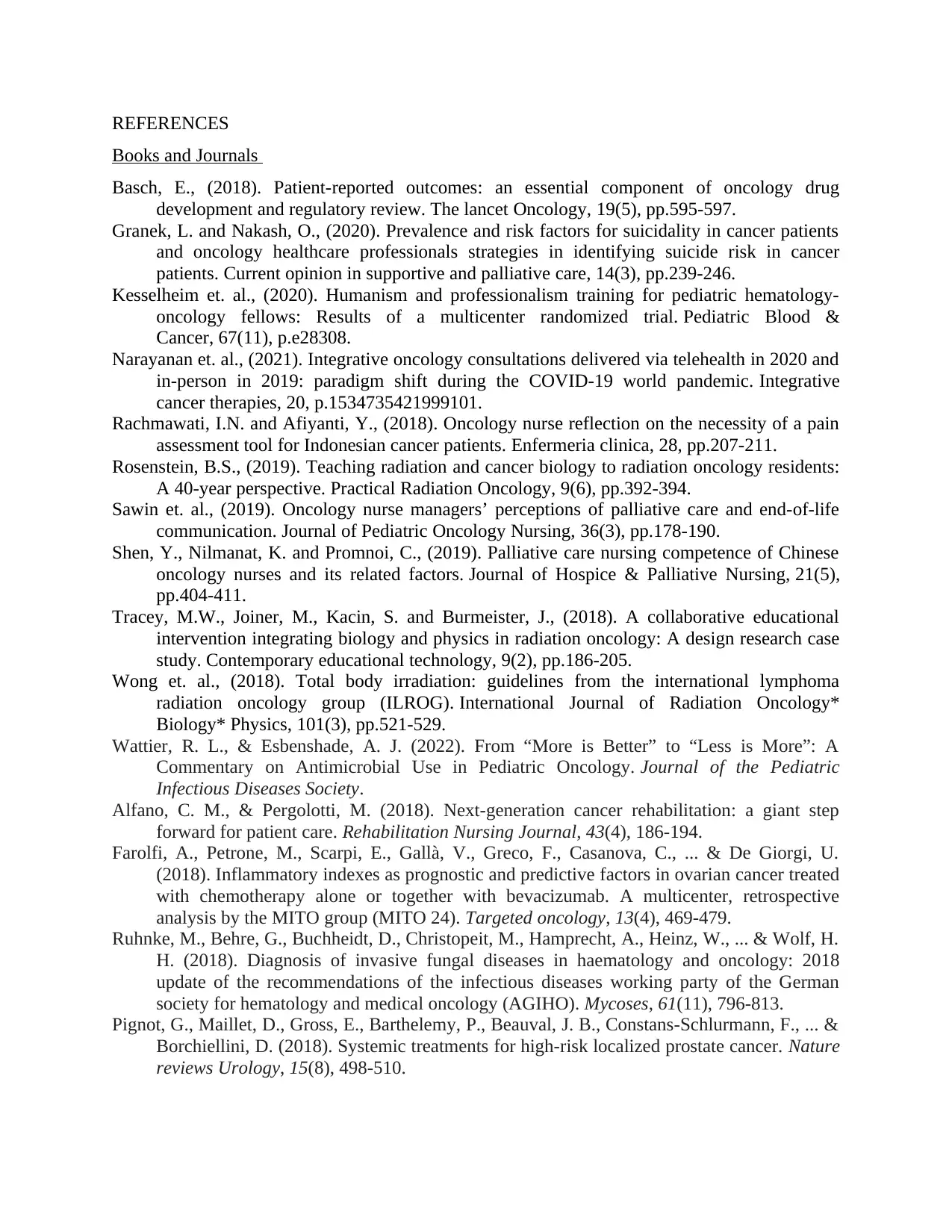
REFERENCES
Books and Journals
Basch, E., (2018). Patient-reported outcomes: an essential component of oncology drug
development and regulatory review. The lancet Oncology, 19(5), pp.595-597.
Granek, L. and Nakash, O., (2020). Prevalence and risk factors for suicidality in cancer patients
and oncology healthcare professionals strategies in identifying suicide risk in cancer
patients. Current opinion in supportive and palliative care, 14(3), pp.239-246.
Kesselheim et. al., (2020). Humanism and professionalism training for pediatric hematology‐
oncology fellows: Results of a multicenter randomized trial. Pediatric Blood &
Cancer, 67(11), p.e28308.
Narayanan et. al., (2021). Integrative oncology consultations delivered via telehealth in 2020 and
in-person in 2019: paradigm shift during the COVID-19 world pandemic. Integrative
cancer therapies, 20, p.1534735421999101.
Rachmawati, I.N. and Afiyanti, Y., (2018). Oncology nurse reflection on the necessity of a pain
assessment tool for Indonesian cancer patients. Enfermeria clinica, 28, pp.207-211.
Rosenstein, B.S., (2019). Teaching radiation and cancer biology to radiation oncology residents:
A 40-year perspective. Practical Radiation Oncology, 9(6), pp.392-394.
Sawin et. al., (2019). Oncology nurse managers’ perceptions of palliative care and end-of-life
communication. Journal of Pediatric Oncology Nursing, 36(3), pp.178-190.
Shen, Y., Nilmanat, K. and Promnoi, C., (2019). Palliative care nursing competence of Chinese
oncology nurses and its related factors. Journal of Hospice & Palliative Nursing, 21(5),
pp.404-411.
Tracey, M.W., Joiner, M., Kacin, S. and Burmeister, J., (2018). A collaborative educational
intervention integrating biology and physics in radiation oncology: A design research case
study. Contemporary educational technology, 9(2), pp.186-205.
Wong et. al., (2018). Total body irradiation: guidelines from the international lymphoma
radiation oncology group (ILROG). International Journal of Radiation Oncology*
Biology* Physics, 101(3), pp.521-529.
Wattier, R. L., & Esbenshade, A. J. (2022). From “More is Better” to “Less is More”: A
Commentary on Antimicrobial Use in Pediatric Oncology. Journal of the Pediatric
Infectious Diseases Society.
Alfano, C. M., & Pergolotti, M. (2018). Next-generation cancer rehabilitation: a giant step
forward for patient care. Rehabilitation Nursing Journal, 43(4), 186-194.
Farolfi, A., Petrone, M., Scarpi, E., Gallà, V., Greco, F., Casanova, C., ... & De Giorgi, U.
(2018). Inflammatory indexes as prognostic and predictive factors in ovarian cancer treated
with chemotherapy alone or together with bevacizumab. A multicenter, retrospective
analysis by the MITO group (MITO 24). Targeted oncology, 13(4), 469-479.
Ruhnke, M., Behre, G., Buchheidt, D., Christopeit, M., Hamprecht, A., Heinz, W., ... & Wolf, H.
H. (2018). Diagnosis of invasive fungal diseases in haematology and oncology: 2018
update of the recommendations of the infectious diseases working party of the German
society for hematology and medical oncology (AGIHO). Mycoses, 61(11), 796-813.
Pignot, G., Maillet, D., Gross, E., Barthelemy, P., Beauval, J. B., Constans-Schlurmann, F., ... &
Borchiellini, D. (2018). Systemic treatments for high-risk localized prostate cancer. Nature
reviews Urology, 15(8), 498-510.
Books and Journals
Basch, E., (2018). Patient-reported outcomes: an essential component of oncology drug
development and regulatory review. The lancet Oncology, 19(5), pp.595-597.
Granek, L. and Nakash, O., (2020). Prevalence and risk factors for suicidality in cancer patients
and oncology healthcare professionals strategies in identifying suicide risk in cancer
patients. Current opinion in supportive and palliative care, 14(3), pp.239-246.
Kesselheim et. al., (2020). Humanism and professionalism training for pediatric hematology‐
oncology fellows: Results of a multicenter randomized trial. Pediatric Blood &
Cancer, 67(11), p.e28308.
Narayanan et. al., (2021). Integrative oncology consultations delivered via telehealth in 2020 and
in-person in 2019: paradigm shift during the COVID-19 world pandemic. Integrative
cancer therapies, 20, p.1534735421999101.
Rachmawati, I.N. and Afiyanti, Y., (2018). Oncology nurse reflection on the necessity of a pain
assessment tool for Indonesian cancer patients. Enfermeria clinica, 28, pp.207-211.
Rosenstein, B.S., (2019). Teaching radiation and cancer biology to radiation oncology residents:
A 40-year perspective. Practical Radiation Oncology, 9(6), pp.392-394.
Sawin et. al., (2019). Oncology nurse managers’ perceptions of palliative care and end-of-life
communication. Journal of Pediatric Oncology Nursing, 36(3), pp.178-190.
Shen, Y., Nilmanat, K. and Promnoi, C., (2019). Palliative care nursing competence of Chinese
oncology nurses and its related factors. Journal of Hospice & Palliative Nursing, 21(5),
pp.404-411.
Tracey, M.W., Joiner, M., Kacin, S. and Burmeister, J., (2018). A collaborative educational
intervention integrating biology and physics in radiation oncology: A design research case
study. Contemporary educational technology, 9(2), pp.186-205.
Wong et. al., (2018). Total body irradiation: guidelines from the international lymphoma
radiation oncology group (ILROG). International Journal of Radiation Oncology*
Biology* Physics, 101(3), pp.521-529.
Wattier, R. L., & Esbenshade, A. J. (2022). From “More is Better” to “Less is More”: A
Commentary on Antimicrobial Use in Pediatric Oncology. Journal of the Pediatric
Infectious Diseases Society.
Alfano, C. M., & Pergolotti, M. (2018). Next-generation cancer rehabilitation: a giant step
forward for patient care. Rehabilitation Nursing Journal, 43(4), 186-194.
Farolfi, A., Petrone, M., Scarpi, E., Gallà, V., Greco, F., Casanova, C., ... & De Giorgi, U.
(2018). Inflammatory indexes as prognostic and predictive factors in ovarian cancer treated
with chemotherapy alone or together with bevacizumab. A multicenter, retrospective
analysis by the MITO group (MITO 24). Targeted oncology, 13(4), 469-479.
Ruhnke, M., Behre, G., Buchheidt, D., Christopeit, M., Hamprecht, A., Heinz, W., ... & Wolf, H.
H. (2018). Diagnosis of invasive fungal diseases in haematology and oncology: 2018
update of the recommendations of the infectious diseases working party of the German
society for hematology and medical oncology (AGIHO). Mycoses, 61(11), 796-813.
Pignot, G., Maillet, D., Gross, E., Barthelemy, P., Beauval, J. B., Constans-Schlurmann, F., ... &
Borchiellini, D. (2018). Systemic treatments for high-risk localized prostate cancer. Nature
reviews Urology, 15(8), 498-510.
⊘ This is a preview!⊘
Do you want full access?
Subscribe today to unlock all pages.

Trusted by 1+ million students worldwide
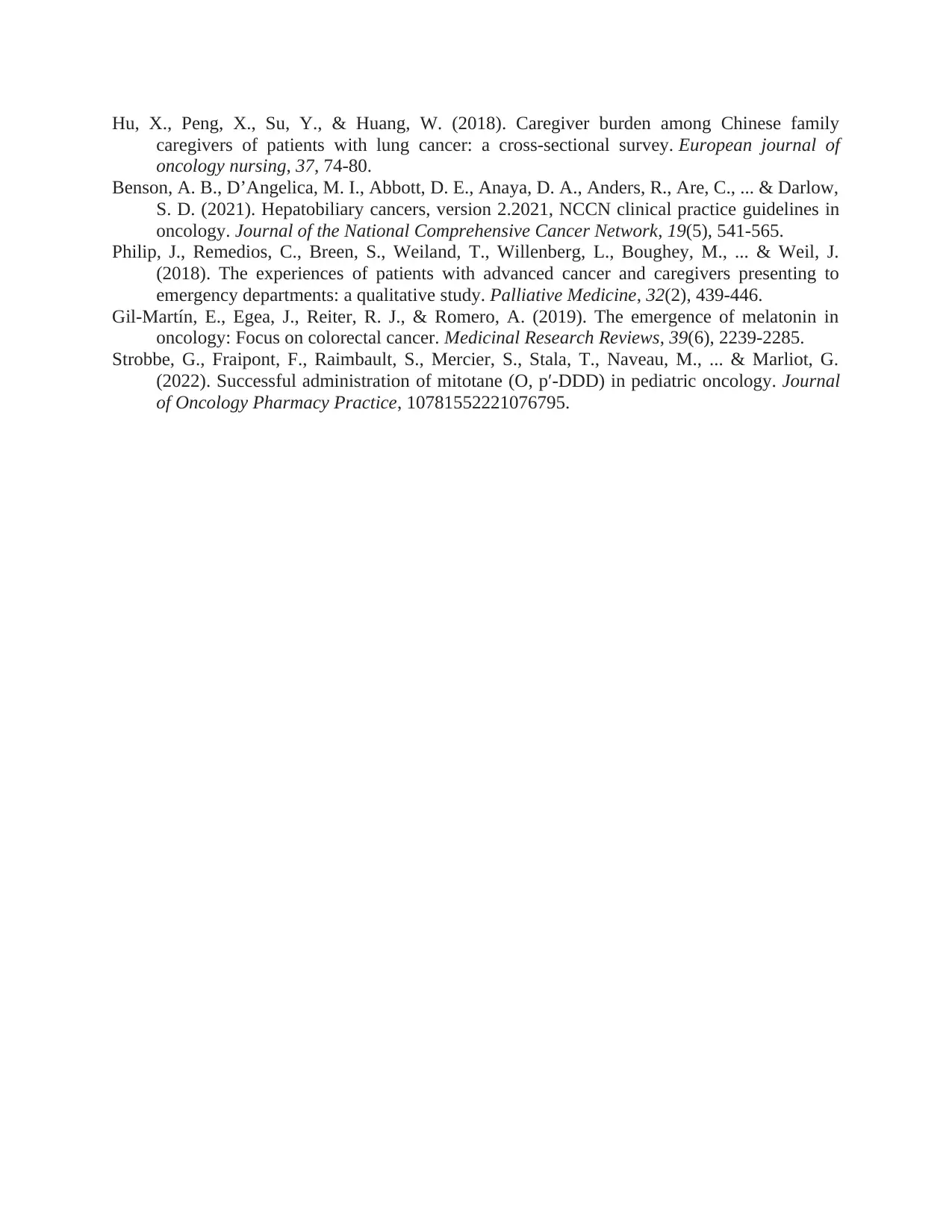
Hu, X., Peng, X., Su, Y., & Huang, W. (2018). Caregiver burden among Chinese family
caregivers of patients with lung cancer: a cross-sectional survey. European journal of
oncology nursing, 37, 74-80.
Benson, A. B., D’Angelica, M. I., Abbott, D. E., Anaya, D. A., Anders, R., Are, C., ... & Darlow,
S. D. (2021). Hepatobiliary cancers, version 2.2021, NCCN clinical practice guidelines in
oncology. Journal of the National Comprehensive Cancer Network, 19(5), 541-565.
Philip, J., Remedios, C., Breen, S., Weiland, T., Willenberg, L., Boughey, M., ... & Weil, J.
(2018). The experiences of patients with advanced cancer and caregivers presenting to
emergency departments: a qualitative study. Palliative Medicine, 32(2), 439-446.
Gil‐Martín, E., Egea, J., Reiter, R. J., & Romero, A. (2019). The emergence of melatonin in
oncology: Focus on colorectal cancer. Medicinal Research Reviews, 39(6), 2239-2285.
Strobbe, G., Fraipont, F., Raimbault, S., Mercier, S., Stala, T., Naveau, M., ... & Marliot, G.
(2022). Successful administration of mitotane (O, p′-DDD) in pediatric oncology. Journal
of Oncology Pharmacy Practice, 10781552221076795.
caregivers of patients with lung cancer: a cross-sectional survey. European journal of
oncology nursing, 37, 74-80.
Benson, A. B., D’Angelica, M. I., Abbott, D. E., Anaya, D. A., Anders, R., Are, C., ... & Darlow,
S. D. (2021). Hepatobiliary cancers, version 2.2021, NCCN clinical practice guidelines in
oncology. Journal of the National Comprehensive Cancer Network, 19(5), 541-565.
Philip, J., Remedios, C., Breen, S., Weiland, T., Willenberg, L., Boughey, M., ... & Weil, J.
(2018). The experiences of patients with advanced cancer and caregivers presenting to
emergency departments: a qualitative study. Palliative Medicine, 32(2), 439-446.
Gil‐Martín, E., Egea, J., Reiter, R. J., & Romero, A. (2019). The emergence of melatonin in
oncology: Focus on colorectal cancer. Medicinal Research Reviews, 39(6), 2239-2285.
Strobbe, G., Fraipont, F., Raimbault, S., Mercier, S., Stala, T., Naveau, M., ... & Marliot, G.
(2022). Successful administration of mitotane (O, p′-DDD) in pediatric oncology. Journal
of Oncology Pharmacy Practice, 10781552221076795.
1 out of 10
Related Documents
Your All-in-One AI-Powered Toolkit for Academic Success.
+13062052269
info@desklib.com
Available 24*7 on WhatsApp / Email
![[object Object]](/_next/static/media/star-bottom.7253800d.svg)
Unlock your academic potential
Copyright © 2020–2026 A2Z Services. All Rights Reserved. Developed and managed by ZUCOL.





